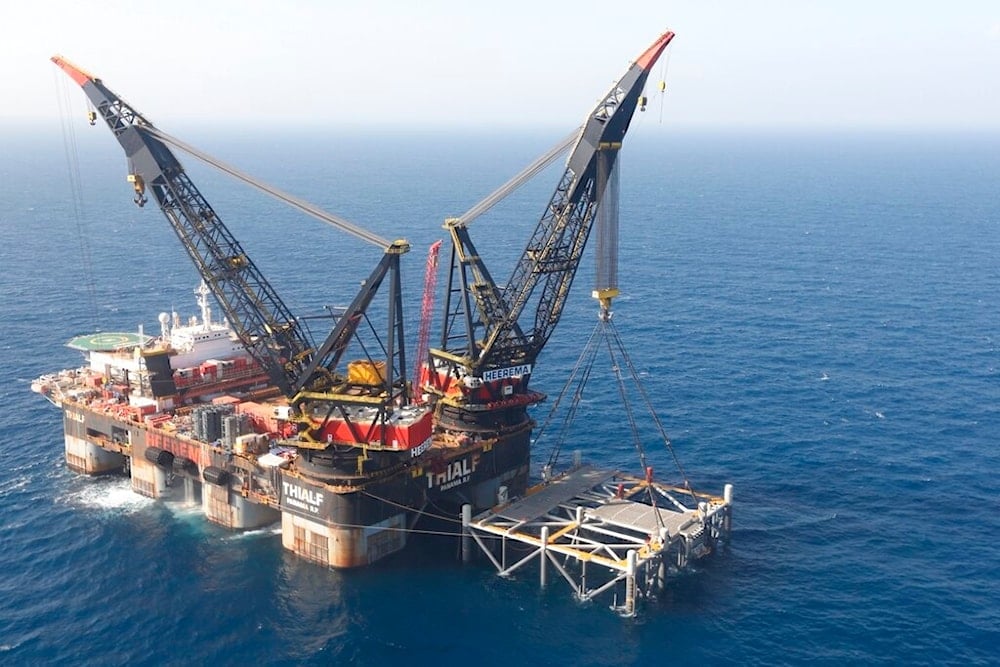Netanyahu freezes $35 bln gas deal with Egypt over troops in Sinai
Netanyahu has frozen a $35 billion gas deal with Egypt, using Cairo's energy crisis as leverage while citing allegations of Sinai tunnels and troop buildups.
-

This Jan. 31, 2019 file photo, shows an oil platform in the Leviathan natural gas field, in the Mediterranean Sea off the Palestinian coast. (AP)
The Israeli daily Israel Hayom on Tuesday reported that Prime Minister Benjamin Netanyahu has halted the advancement of the massive Leviathan gas export agreement with Egypt, insisting it will not proceed without his personal approval. The move comes amid claims that Cairo has breached security provisions of the 1979 normalization agreement.
Netanyahu is expected to consult with Energy Minister Eli Cohen, a member of the Security Cabinet and the official empowered to ratify such contracts. Without Cohen's signature, the agreement cannot come into effect.
Gas leverage
Three weeks ago, Leviathan partners Ratio and NewMed Energy, part of Yitzhak Tshuva's Delek Group, signed a deal with Egypt's Blue Ocean Energy (BOE) to export 130 billion cubic meters of gas through 2040, worth roughly $35 billion. Billed as the largest energy agreement in "Israel's" history, it was meant to extend the existing gas trade that has seen Israeli supplies flow to Egypt since 2019.
Israel Hayom claimed that US-led monitors had scaled back oversight of Egyptian deployments in Sinai, accusing Cairo of building tunnels, lengthening runways, and stationing troops and armor beyond the treaty's limits. "Israel's" ambassador to Washington, Yechiel Leiter, even lobbied the Trump administration to increase scrutiny.
Yet critics note that these "violations" are cited just as Egypt has been among the most outspoken Arab states demanding an end to "Israel's" war on Gaza and supporting South Africa's genocide case at the International Court of Justice.
Energy pressure politics
For the first time, "Israel" is openly weaponizing gas sales as political leverage. Netanyahu and Cohen are expected to demand "guarantees" from Egypt before releasing desperately needed energy supplies. Cairo, struggling with power cuts and declining output from its Zohr field, has turned to Israeli imports to meet basic domestic demand. In 2022, under EU pressure, Egypt signed a trilateral deal with Tel Aviv and Brussels to redirect Eastern Mediterranean gas to Europe, cementing dependence on Israeli energy at the expense of its own autonomy.
By freezing the deal, Netanyahu is tying Egypt's energy survival to its willingness to bow to Israeli dictates, both regarding Sinai deployments and the sensitive Philadelphi Corridor along Gaza's border. "Israel" insists the corridor conceals smuggling tunnels; Egypt has denied the claims and warned that any Israeli seizure of the area would itself breach the peace treaty.
Read more: Israelis to Egypt: We will not tolerate military buildup in Sinai
Observers argue that Netanyahu's move illustrates how Tel Aviv is exploiting Egypt's energy crisis to silence Cairo's opposition to the Gaza genocide, turning natural gas into yet another instrument of coercion in the broader regional struggle.

 3 Min Read
3 Min Read








